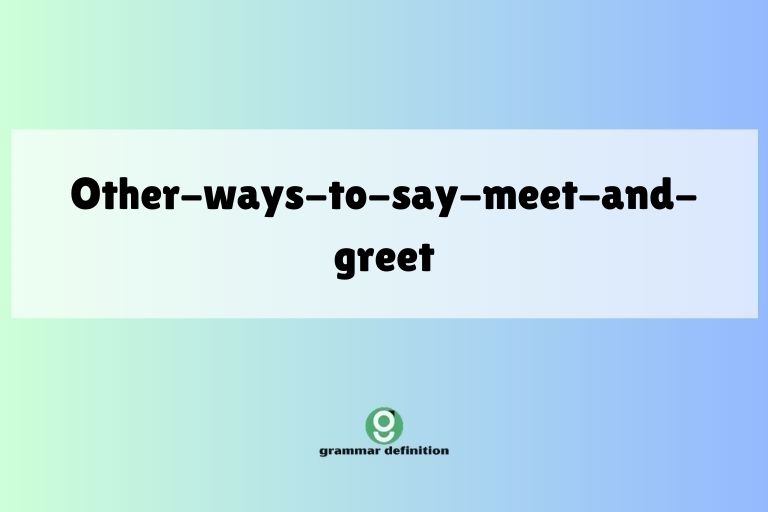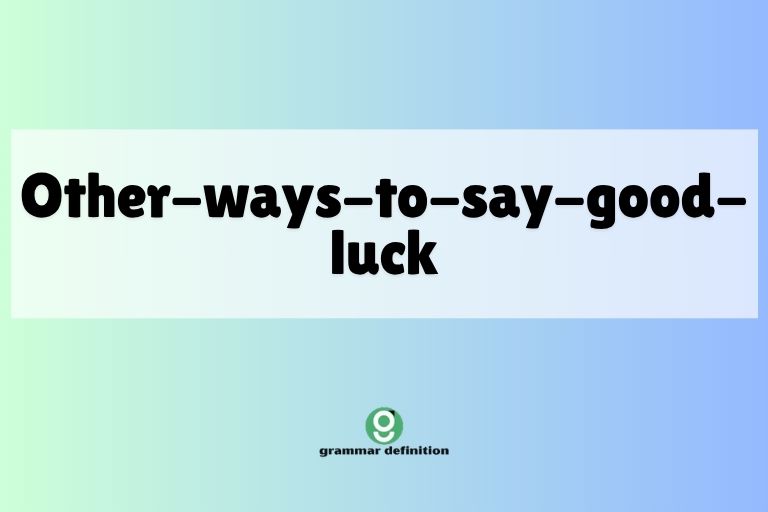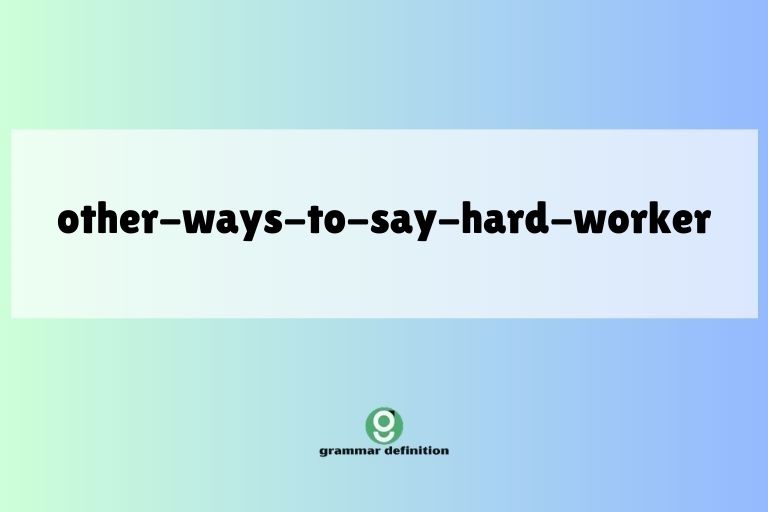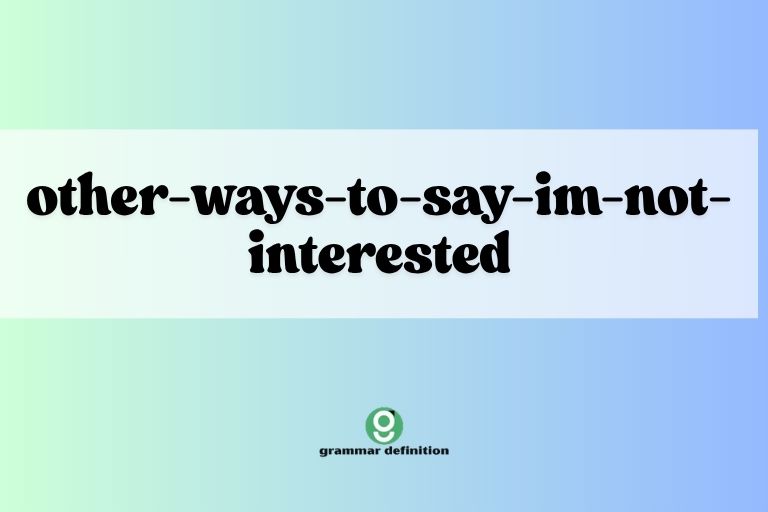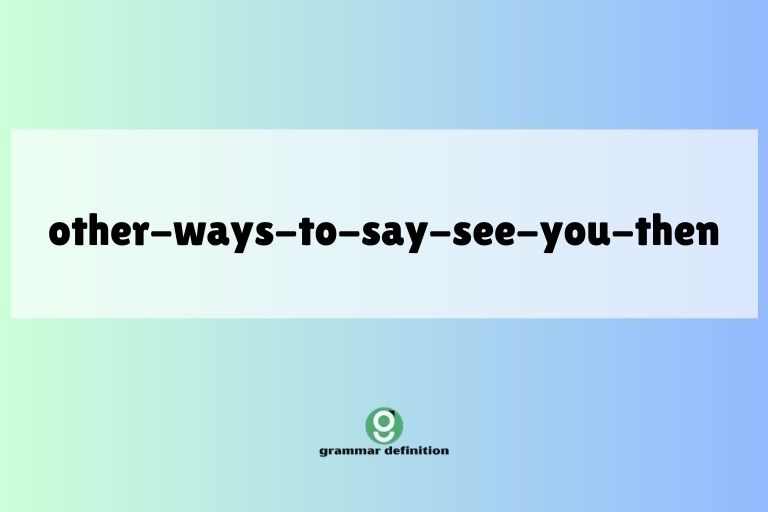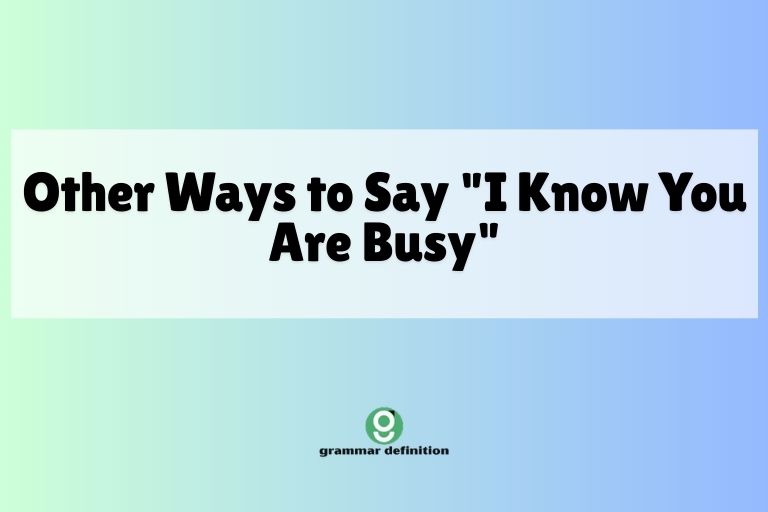Beyond “I Wish You the Best”: Diverse Ways to Express Good Wishes
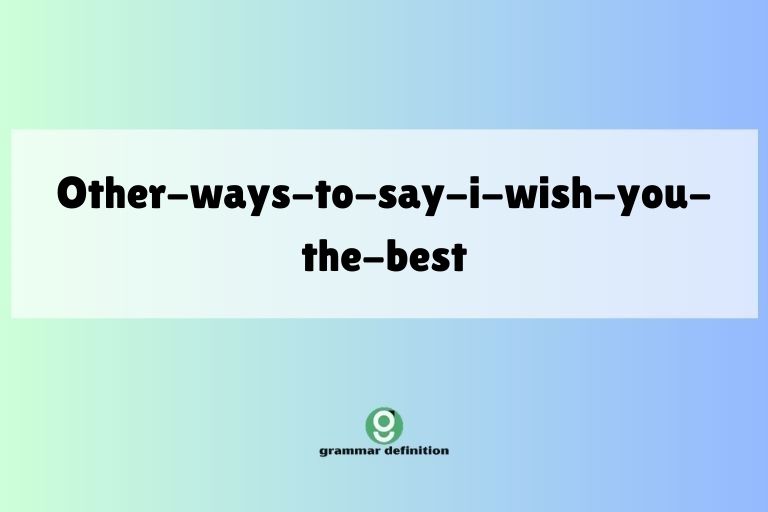
Expressing good wishes is a fundamental aspect of human communication, fostering positive relationships and conveying genuine care. While “I wish you the best” is a common and perfectly acceptable phrase, relying solely on it can limit the richness and nuance of your expressions.
This article delves into a variety of alternative phrases and expressions, exploring their specific contexts, connotations, and grammatical structures. Understanding these alternatives will empower you to communicate more effectively and authentically, allowing you to tailor your well-wishes to suit different situations and relationships.
This comprehensive guide is designed for English language learners of all levels, from beginners seeking to expand their vocabulary to advanced speakers aiming to refine their expressive abilities.
Table of Contents
- Introduction
- Definition: Expressing Good Wishes
- Structural Breakdown
- Types and Categories of Expressions
- Examples
- Usage Rules
- Common Mistakes
- Practice Exercises
- Advanced Topics
- FAQ
- Conclusion
Definition: Expressing Good Wishes
Expressing good wishes involves conveying positive sentiments, hopes, and encouragement to another person. It’s a form of social interaction that strengthens relationships and creates a sense of connection.
The act of wishing someone well transcends simple politeness; it reflects empathy, care, and a genuine desire for the recipient’s happiness and success. These expressions can range from simple, everyday phrases to more elaborate and context-specific pronouncements.
The choice of expression depends heavily on the relationship between the speaker and the recipient, the specific situation, and the desired level of formality.
Functionally, expressing good wishes serves several purposes. It can offer support during challenging times, celebrate achievements, and motivate individuals to pursue their goals.
It also plays a crucial role in maintaining social harmony and fostering a positive environment. The context in which good wishes are expressed significantly influences their impact.
A heartfelt message of support during a difficult period can be far more meaningful than a generic expression of goodwill.
Structural Breakdown
The structure of expressions of good wishes can vary significantly depending on the specific phrase used. However, several common patterns can be identified. Many expressions include a subject (often implied or understood), a verb expressing the wish (e.g., wish, hope, want), and an object or complement specifying the desired outcome for the recipient.
For example, in the phrase “I hope you have a wonderful day,” the structure is as follows:
- Subject: I
- Verb: hope
- Object/Complement: you have a wonderful day
Other expressions may take the form of imperatives, such as “Good luck!” or “Break a leg!”, where the verb is implied or understood. These expressions are typically concise and direct, conveying a sense of encouragement and support.
Still other expressions use more complex sentence structures, incorporating conditional clauses or relative clauses to add nuance and detail. Understanding these structural elements can help you create your own unique and meaningful expressions of good wishes.
Types and Categories of Expressions
Expressions of good wishes can be categorized based on several factors, including formality, context, and the specific sentiment being conveyed. Here are some key categories:
Formal Expressions
Formal expressions are typically used in professional settings, when addressing someone you don’t know well, or in situations that require a high degree of respect. These expressions often employ more elaborate language and avoid colloquialisms.
Examples include:
- “I extend my best wishes to you.”
- “Please accept my sincere wishes for your success.”
- “I wish you all the best in your future endeavors.”
- “May I offer my heartfelt wishes for your well-being.”
Informal Expressions
Informal expressions are appropriate for use with friends, family, and close colleagues. These expressions tend to be more casual and relaxed, often incorporating slang or idiomatic phrases.
Examples include:
- “Good luck with that!”
- “Hope it goes well!”
- “Fingers crossed for you!”
- “All the best!”
- “Knock ’em dead!”
Situation-Specific Expressions
These expressions are tailored to particular situations, such as job interviews, exams, or medical procedures. They often address the specific challenges or opportunities associated with the situation.
Examples include:
- “Best of luck with your interview!”
- “Hope you ace your exam!”
- “Wishing you a speedy recovery!”
- “Congratulations on your new job!”
Expressions of Hope
These expressions focus on conveying hope for a positive outcome or future event.
Examples include:
- “I hope everything works out for you.”
- “I’m hoping for the best.”
- “Let’s hope for a positive outcome.”
- “Here’s hoping things get better.”
Expressions of Encouragement
These expressions aim to boost the recipient’s confidence and motivation.
Examples include:
- “You’ve got this!”
- “I believe in you!”
- “Keep up the good work!”
- “Don’t give up!”
Examples
Here are several examples to illustrate the different ways to express good wishes, categorized for clarity.
General Good Wishes
These expressions are suitable for a wide range of situations and relationships. The following table provides a comprehensive list of general good wishes, offering diverse options for expressing positive sentiments.
| Expression | Context |
|---|---|
| “All the best to you.” | General, versatile |
| “Wishing you well.” | General, slightly formal |
| “I hope things go well for you.” | Expressing hope for a positive outcome |
| “May good things come your way.” | Expressing a desire for positive experiences |
| “Take care.” | General, often used when parting |
| “I wish you happiness and success.” | Combining wishes for both personal and professional fulfillment |
| “Good luck with everything.” | General, applicable to various situations |
| “I hope you have a wonderful day.” | Specific to the current day |
| “Have a good one!” | Informal, general |
| “I’m rooting for you.” | Expressing strong support |
| “I’m thinking of you and wishing you the best.” | Expressing care and support |
| “Sending you positive vibes.” | Informal, expressing positive energy |
| “I hope you find what you’re looking for.” | Wishing someone success in their search |
| “May your dreams come true.” | Expressing a desire for someone’s aspirations to be realized |
| “I hope you achieve your goals.” | Wishing someone success in their endeavors |
| “Wishing you all the best in the future.” | General wish for future success and happiness |
| “May your future be bright.” | Expressing hope for a positive future |
| “I wish you a lifetime of happiness.” | Expressing a wish for long-term happiness |
| “May your journey be filled with joy.” | Wishing someone a fulfilling and enjoyable experience |
| “I hope you find peace and contentment.” | Wishing someone inner peace and satisfaction |
| “Best wishes for a bright future.” | Formal, wishing someone well in their life ahead. |
| “All the best in your endeavors.” | Formal, wishing someone success in their undertakings. |
| “May fortune smile upon you.” | Literary, wishing someone good luck and success. |
| “Have a great time!” | Informal, wishing someone enjoyment in a particular activity. |
| “Good luck and Godspeed.” | Formal, wishing someone well and a safe journey or endeavor. |
Wishes for Success
These expressions are specifically tailored to situations where someone is striving for a particular achievement, such as a job interview, exam, or competition. The table below provides a variety of success-oriented wishes to offer encouragement and support.
| Expression | Context |
|---|---|
| “Good luck!” | General wish for success |
| “Break a leg!” | Informal, theatrical context, meaning “good luck” |
| “Knock ’em dead!” | Informal, meaning “impress them greatly” |
| “I hope you do well.” | Expressing hope for a positive outcome |
| “I’m sure you’ll do great.” | Expressing confidence in someone’s abilities |
| “Give it your best shot.” | Encouraging someone to try their hardest |
| “Do your best.” | Encouraging someone to perform to their highest potential |
| “I have every confidence in you.” | Expressing strong belief in someone’s abilities |
| “I’m behind you all the way.” | Expressing unwavering support |
| “Go get ’em!” | Informal, encouraging someone to be assertive and successful |
| “Wishing you the best of luck.” | Formal, wishing someone success |
| “May success be with you.” | Expressing a desire for someone to achieve success |
| “I hope you achieve your goals.” | Wishing someone success in their endeavors |
| “May you reach new heights.” | Expressing a desire for someone to achieve great things |
| “Wishing you a resounding success.” | Expressing a wish for overwhelming success |
| “I hope you shine.” | Wishing someone to excel and stand out |
| “May your efforts be rewarded.” | Expressing a wish for someone’s hard work to pay off |
| “I trust you’ll succeed.” | Expressing confidence in someone’s ability to achieve their goals. |
| “May you come out on top.” | Wishing someone to be victorious or successful. |
| “Wishing you a triumph.” | Expressing a desire for someone to achieve a great victory. |
| “I hope you emerge victorious.” | Wishing someone success in a competitive situation. |
| “May your hard work pay off.” | Expressing a wish that someone’s efforts yield positive results. |
| “Wishing you a breakthrough.” | Expressing a desire for someone to achieve a significant advancement. |
| “May you surpass all expectations.” | Expressing a wish for someone to exceed anticipated outcomes. |
Wishes for Health and Well-being
These expressions are used to convey concern and support for someone who is ill or recovering from an injury. The following table offers a range of health-related wishes, providing options for expressing care and hope for a speedy recovery.
| Expression | Context |
|---|---|
| “Get well soon.” | General wish for recovery |
| “Wishing you a speedy recovery.” | Expressing a desire for a quick recovery |
| “Hope you feel better soon.” | Expressing hope for improved health |
| “Take care of yourself.” | Encouraging someone to prioritize their health |
| “I hope you’re back on your feet soon.” | Expressing a desire for someone to regain their health and mobility |
| “Thinking of you and wishing you well.” | Expressing care and support during illness |
| “Sending you healing thoughts.” | Expressing positive energy and hope for recovery |
| “May you be blessed with good health.” | Expressing a desire for someone to have long-lasting good health |
| “I hope you’re resting comfortably.” | Expressing concern for someone’s comfort during illness |
| “Wishing you strength and comfort.” | Expressing a desire for someone to have the strength to cope with illness and the comfort to ease their suffering |
| “Get plenty of rest.” | Encouraging someone to prioritize rest for recovery |
| “Take it easy.” | Encouraging someone to avoid overexertion during recovery |
| “Listen to your doctor.” | Encouraging someone to follow medical advice |
| “I hope you’re getting the best care.” | Expressing concern for the quality of medical care someone is receiving |
| “May your health improve with each passing day.” | Expressing a desire for steady improvement in health |
| “Wishing you renewed health.” | Formal, expressing a desire for a return to good health. |
| “May you be restored to full health.” | Expressing a desire for complete recovery from illness. |
| “Wishing you a swift and complete recovery.” | Expressing a desire for a quick and thorough return to health. |
| “May you find relief from your suffering.” | Expressing empathy and a desire for someone’s pain to ease. |
| “May your body heal and your spirit be strong.” | Expressing a desire for both physical and emotional recovery. |
| “Thinking of you during this difficult time.” | Offering support and concern during a period of illness. |
| “Sending you my warmest regards and wishes for wellness.” | Offering sincere wishes for good health and well-being. |
| “May you regain your strength and vitality.” | Expressing a desire for someone to recover their energy and vigor. |
| “Wishing you comfort and peace as you heal.” | Offering wishes for tranquility and ease during the healing process. |
Wishes for Happiness
These expressions are used to convey a desire for someone’s happiness and well-being. The following table provides a variety of happiness-related wishes, offering options for expressing positive sentiments and hopes for joy and contentment.
| Expression | Context |
|---|---|
| “I hope you’re happy.” | Expressing a desire for someone’s happiness |
| “Wishing you happiness.” | General wish for happiness |
| “May you find happiness.” | Expressing a desire for someone to discover happiness |
| “I hope you find joy in every day.” | Expressing a desire for someone to experience daily happiness |
| “Wishing you a life filled with happiness.” | Expressing a desire for someone to have a long and happy life |
| “May your days be filled with sunshine.” | Expressing a desire for someone to experience bright and cheerful days |
| “I hope you find peace and contentment.” | Expressing a desire for someone to find inner peace and satisfaction |
| “Wishing you all the best in life.” | General wish for happiness and success in all aspects of life |
| “May your heart be filled with love and laughter.” | Expressing a desire for someone to experience love and joy |
| “I hope you find everything you’re looking for.” | Expressing a desire for someone to achieve their goals and aspirations |
| “Wishing you endless smiles.” | Expressing a desire for someone to experience constant joy |
| “May your life be a celebration.” | Expressing a desire for someone to live a joyful and fulfilling life |
| “I hope you’re surrounded by love and happiness.” | Expressing a desire for someone to be surrounded by positive influences |
| “Wishing you moments of pure bliss.” | Expressing a desire for someone to experience moments of perfect happiness |
| “May your spirit be light and your heart be full.” | Expressing a desire for someone to have a carefree and joyful attitude |
| “Wishing you abundant joy.” | Expressing a desire for someone to experience a great deal of happiness. |
| “May your days be merry and bright.” | Expressing a desire for someone to have cheerful and pleasant days. |
| “Wishing you a life of contentment.” | Expressing a desire for someone to live a satisfied and fulfilled life. |
| “May you always find reasons to smile.” | Expressing a desire for someone to consistently experience joy. |
| “Wishing you peace, love, and happiness.” | Expressing a desire for someone to have inner peace, affection, and joy. |
| “May you be blessed with happiness.” | Expressing a desire for someone to receive joy as a gift or blessing. |
| “Wishing you sunshine in your soul.” | Expressing a desire for someone to have an inner sense of joy and brightness. |
| “May your journey be filled with laughter.” | Expressing a desire for someone to experience joy and amusement throughout their life. |
Wishes for the Future
These expressions are used to convey hopes and positive expectations for someone’s future endeavors and life path. The following table provides a variety of future-oriented wishes, offering options for expressing support and optimism.
| Expression | Context |
|---|---|
| “I hope the future is bright for you.” | Expressing a desire for a positive future |
| “Wishing you a successful future.” | General wish for future success |
| “May your dreams come true.” | Expressing a desire for someone to achieve their aspirations |
| “I hope you achieve all your goals.” | Expressing a desire for someone to accomplish their objectives |
| “Wishing you a fulfilling life.” | Expressing a desire for someone to live a meaningful and satisfying life |
| “May your future be filled with happiness and success.” | Expressing a desire for someone to experience both joy and achievement |
| “I hope you find your path.” | Expressing a desire for someone to discover their purpose in life |
| “Wishing you all the best in your future endeavors.” | General wish for success in future undertakings |
| “May you reach your full potential.” | Expressing a desire for someone to maximize their abilities and talents |
| “I hope you create a life you love.” | Expressing a desire for someone to build a fulfilling and enjoyable life |
| “Wishing you a lifetime of happiness.” | Expressing a desire for someone to experience long-term joy and contentment |
| “May your journey be filled with joy and adventure.” | Expressing a desire for someone to have a fulfilling and exciting life |
| “I hope you make a positive impact on the world.” | Expressing a desire for someone to contribute to society in a meaningful way |
| “Wishing you a future filled with love and laughter.” | Expressing a desire for someone to experience strong connections and joy |
| “May your future be as bright as your dreams.” | Expressing a desire for someone’s future to be as promising as their aspirations |
| “Wishing you a prosperous future.” | Expressing a desire for someone to have financial success and well-being. |
| “May your future be abundant with opportunities.” | Expressing a desire for someone to have many chances for success and growth. |
| “Wishing you a future of endless possibilities.” | Expressing a desire for someone to have a future with limitless potential. |
| “May your future unfold beautifully.” | Expressing a desire for someone’s life to progress in a positive and harmonious way. |
| “Wishing you a future that exceeds your expectations.” | Expressing a desire for someone’s life to be even better than they hope for. |
| “May your future be filled with purpose and passion.” | Expressing a desire for someone to have a life driven by meaning and enthusiasm. |
| “Wishing you a future where your dreams take flight.” | Expressing a desire for someone to achieve their aspirations and soar to new heights. |
| “May your future be written with success and happiness.” | Expressing a desire for someone to have a life story filled with achievement and joy. |
Usage Rules
Proper usage of expressions of good wishes involves considering formality, context, and grammatical correctness.
Formal vs. Informal Usage
As previously discussed, the level of formality should align with the relationship and setting. Using overly casual language in a formal setting can be perceived as disrespectful, while using overly formal language with close friends can sound unnatural.
Contextual Appropriateness
The specific situation should also influence your choice of expression. For example, wishing someone “Good luck!” before a medical procedure might be considered insensitive.
In such cases, expressions of concern and hope for a speedy recovery would be more appropriate.
Grammatical Considerations
Ensure that the expression you choose is grammatically correct. Pay attention to verb tense, subject-verb agreement, and proper use of prepositions.
Incorrect grammar can undermine the sincerity of your message.
Common Mistakes
Here are some common mistakes to avoid when expressing good wishes:
| Incorrect | Correct | Explanation |
|---|---|---|
| “Good luck for you.” | “Good luck to you.” | The correct preposition is “to.” |
| “I wish you a best.” | “I wish you the best.” | “Best” is a superlative and requires the definite article “the.” |
| “Hope you will good.” | “Hope you will be well.” or “Hope you are doing well.” | The correct verb form is “be well” or “are doing well.” |
| “Wishing you to get well soon.” | “Wishing you a speedy recovery.” | Expressing a wish for a speedy recovery sounds more natural. |
Practice Exercises
Test your understanding with these practice exercises.
| Question | Answer |
|---|---|
| 1. You are writing a formal email to a colleague who is starting a new job. Which of the following is most appropriate? a) “Good luck!” b) “All the best!” c) “I extend my best wishes to you.” | c) “I extend my best wishes to you.” |
| 2. Your friend is about to take an important exam. Which of the following is most encouraging? a) “Hope it goes okay.” b) “I’m sure you’ll ace it!” c) “Good luck, I guess.” | b) “I’m sure you’ll ace it!” |
| 3. Your neighbor is recovering from surgery. Which of the following is most appropriate? a) “Get well soon!” b) “Hope you’re back on your feet soon.” c) “Take care.” | b) “Hope you’re back on your feet soon.” |
| 4. Your family member is about to perform on stage. Which of the following is most appropriate? a) “Good luck.” b) “Break a leg!” c) “Do your best.” | b) “Break a leg!” |
| 5. You are talking to a friend who is feeling down. Which of the following is most supportive? a) “Hope things get better.” b) “You’ll get through this.” c) “Sending you positive vibes.” | b) “You’ll get through this.” or c) “Sending you positive vibes.” |
| 6. You are writing a card to congratulate someone on their retirement. Which sentence is most appropriate? a) “Have a good one!” b) “Wishing you a happy retirement!” c) “Good luck with everything!” | b) “Wishing you a happy retirement!” |
| 7. You are talking to someone who is starting a new business. Which of the following is most encouraging? a) “Hope it works out.” b) “May success be with you.” c) “Good luck with that.” | b) “May success be with you.” |
| 8. Your friend tells you they’re going through a tough time. What do you say? a) “That’s rough, buddy.” b) “Sending you strength and comfort.” c) “It is what it is.” | b) “Sending you strength and comfort.” |
| 9. Which of the following is a wish specifically for someone’s future? a) “All the best.” b) “Wishing you a lifetime of happiness.” c) “Get well soon.” | b) “Wishing you a lifetime of happiness.” |
| 10. Which of the following options is the most appropriate way to congratulate someone on their engagement? a) “Good luck with that.” b) “Congratulations on your engagement! Wishing you a lifetime of happiness together.” c) “I hope you two are happy.” | b) “Congratulations on your engagement! Wishing you a lifetime of happiness together.” |
Advanced Topics
For advanced learners, understanding the nuances of idiomatic expressions, cultural considerations, and intonation can further enhance their ability to express good wishes effectively.
Idiomatic Expressions
English is rich in idiomatic expressions, many of which can be used to convey good wishes in a more colorful and engaging way. However, it’s important to understand the specific meaning and context of each idiom before using it.
Examples include:
- “To be on cloud nine” (to be extremely happy)
- “To have the world at your feet” (to be very successful)
- “To come up roses” (to turn out well)
Cultural Considerations
The appropriateness of certain expressions can vary across cultures. What is considered polite and acceptable in one culture may be offensive or inappropriate in another.
It’s essential to be aware of these cultural differences to avoid misunderstandings.
Nuance and Intonation
The way you say something is just as important as what you say. Intonation, facial expressions, and body language can all contribute to the overall message and impact of your expression of good wishes.
A sincere tone and genuine smile can make even the simplest expression more meaningful.
FAQ
Here are some frequently asked questions about expressing good wishes:
- Is “I wish you the best” always appropriate?
While generally acceptable, “I wish you the best” can sometimes sound generic. Consider the context and relationship to determine if a more specific or personalized expression would be more suitable.
- What’s the difference between “good luck” and “best of luck”?
The difference is subtle. “Best of luck” is often considered slightly more formal and conveys a stronger sense of sincerity.
- Is it okay to use slang when expressing good wishes?
Slang can be appropriate in informal settings with close friends, but it should be avoided in formal or professional contexts.
- How can I make my expressions of good wishes more personal?
Tailor your expressions to the specific situation and the individual’s personality. Refer to their goals, aspirations, or challenges to show that you’re genuinely invested in their well-being.
- What should I say to someone who is grieving?
Express your condolences and offer your support. Phrases like “I’m so sorry for your loss” or “My thoughts are with you” can be comforting.
- What should I say when someone is facing a difficult challenge?
Offer encouragement and express your belief in their ability to overcome the challenge. Phrases like “You’ve got this!” or “I know you can do it!” can be motivating.
- How can I express good wishes in a written message?
Use a sincere and heartfelt tone. Avoid clichés and try to personalize your message to the recipient.
- Are there any expressions of good wishes that should be avoided?
Avoid expressions that are insensitive, sarcastic, or dismissive. Be mindful of the recipient’s feelings and the context of the situation.
Conclusion
Mastering the art of expressing good wishes involves understanding the nuances of language, context, and relationships. While “I wish you the best” serves as a reliable default, exploring the diverse range of alternative expressions allows for more meaningful and impactful communication.
By considering formality, situation, and personal connection, you can tailor your well-
wishes to resonate deeply and authentically with the recipient. This not only strengthens interpersonal bonds but also fosters a more positive and supportive environment for everyone involved.
Embrace the power of language to uplift, encourage, and connect with others through heartfelt expressions of goodwill.

